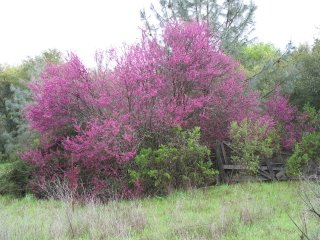Native plants, Tony Avent, blogging, and the fringe.
 The native plant controversy is a new thing for me. My interest started with the palm trees The City of Placerville was having "In n' Out Burger" remove, as the addition of the palms put the burger joint over the allotment of non-native species. I have a friend who is a landscape designer who told me of her frustration at having to deal with the officials at the county, and their insistence that 50% of the commercial landscape be native species to this county. That's Cercis occidentalis (Western redbud) pictured. It covers the lower foothills. Tony Avent ? I had never heard of him, or if I had it didn't register. Maybe I am more like Susie Cohelo than I would like to think. "Across the country, Americans have to get used to the way Californians live" she say's. I have had my head in California sand for too long. You mean there are places where you don't have to water your garden during the summer? Whoa!
The native plant controversy is a new thing for me. My interest started with the palm trees The City of Placerville was having "In n' Out Burger" remove, as the addition of the palms put the burger joint over the allotment of non-native species. I have a friend who is a landscape designer who told me of her frustration at having to deal with the officials at the county, and their insistence that 50% of the commercial landscape be native species to this county. That's Cercis occidentalis (Western redbud) pictured. It covers the lower foothills. Tony Avent ? I had never heard of him, or if I had it didn't register. Maybe I am more like Susie Cohelo than I would like to think. "Across the country, Americans have to get used to the way Californians live" she say's. I have had my head in California sand for too long. You mean there are places where you don't have to water your garden during the summer? Whoa!
Tony is spot on about the native plant movement. I love native plants, but I also realize that hybrids exist that often perform better than species. There is a lot of confusion out in the gardening world these days. Here at the nursery we have started to see the beginning of interest in GMO (genetically modified organism) plants and seeds. Our concern is the mis-understanding of what GMO means. It seems to mean different things to different people. When we tell some customers that many plants like "Early Girl" tomato and a "Fuji" Apple are a result of cross-breeding the red flag goes up. "Those are genetically modified aren't they" Well yes, but not the way you are thinking.
Much of this thinking is due to a lack of information. There is a rush by mainstream media to jump on the current topic of discussion and ride that pony for as long as they can. It sells magazines and air time! Native plants, global warming, GMO's, you name it. Those people who think a hybrid tomato is a GMO need more information. "Early Girl" tomato IS genetically modified, just not in the gene splicing way. It does not occur in nature, but is produced through cross-breeding. Oh, oh, that"s a bad word, "cross breeding", sounds like GMO. Words are powerful.
What excites me is to find out there is so much information being exchanged by bloggers. Bloggers will be the ones that spread the knowledge. Even though you might think you're just an average gardener taking pictures and talking about your garden, the fact that you are using this medium to communicate places you at the fringes of mainstream gardening. That"s great, because it's at the fringes that really cool stuff happens. That"s where the excitement is.